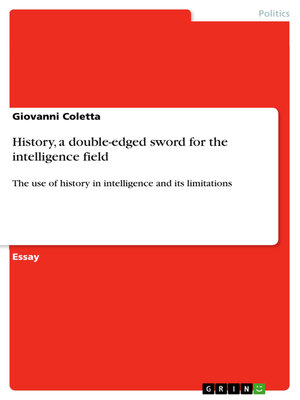History, a double-edged sword for the intelligence field
ebook ∣ The use of history in intelligence and its limitations
By Giovanni Coletta

Sign up to save your library
With an OverDrive account, you can save your favorite libraries for at-a-glance information about availability. Find out more about OverDrive accounts.
Find this title in Libby, the library reading app by OverDrive.



Search for a digital library with this title
Title found at these libraries:
| Library Name | Distance |
|---|---|
| Loading... |
Essay from the year 2017 in the subject Politics - Topic: Peace and Conflict, Security, grade: 60.00, Brunel University (College of Business, Arts and Social Sciences), course: MA Intelligence & Security Studies, language: English, abstract: The relationship between the study of history and the field of intelligence is intriguing and multi-faceted at the same time. The general assumption is that "by studying history, intelligence agencies can learn from past mistakes and aim to improve their performance" (Efren Torres). However, the truth of this belief must be weighed against some limitations that historians meet and that could affect their work. Foremost, there is the problem of the bias of historians and how it can affect the objectivity of their work; secondly, the lack of applicable patterns in using history as a source from which to glean lessons learned; lastly, the inevitable gaps that historians encounter in seeking evidence of the past. This essay focuses on these limitations and on the extent to which they can affect the intelligence performance. It will be argued that the study of history is a double-edged sword to the intelligence field.







